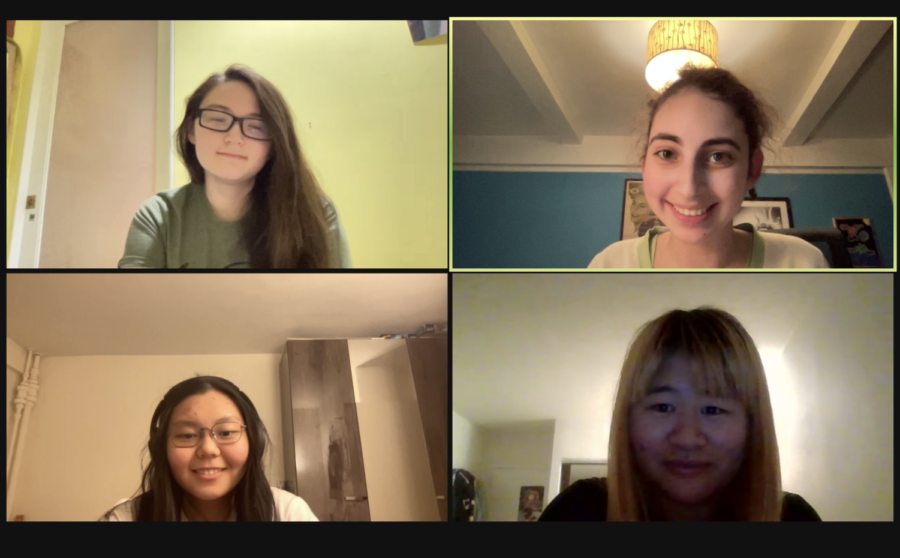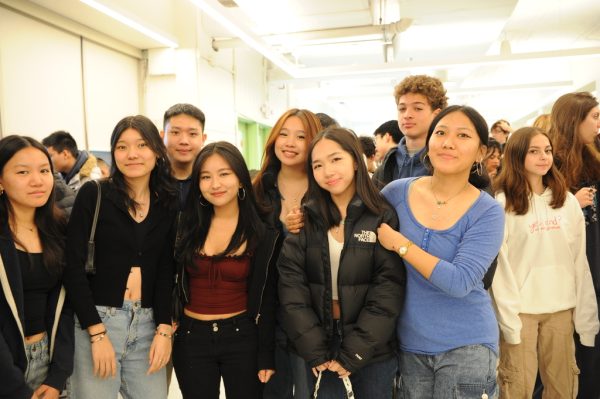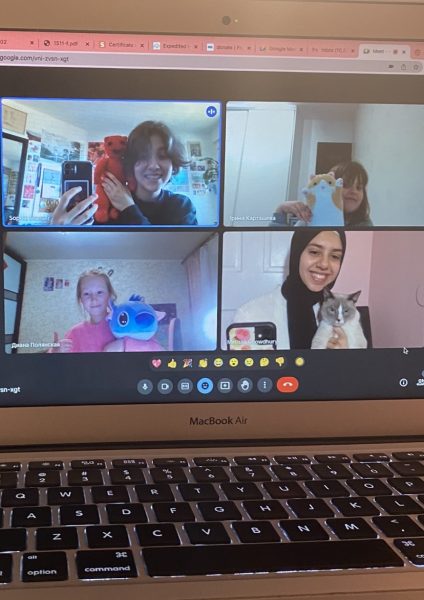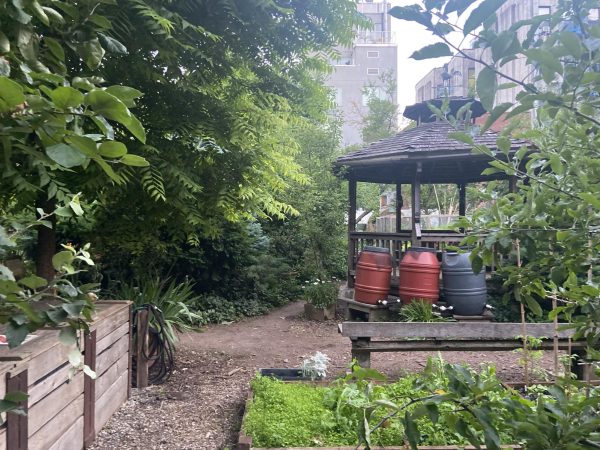February 2022 Advice Column: Tips on Maintaining Your Work/Life Balance
The Editors-in-Chief of ‘The Science Survey’ answer your questions about life during the 2021-2022 academic year.
Some of the Editors-in-Chief of the 2021-2022 ‘The Science Survey’ review student-submitted questions in a Zoom meeting after school (Pictured from left to right, top to bottom, are Sophie Livingston ’22, Maggie Schneider ’22, Carolyn Chui ’22 and Melanie Lin ’22 (Not pictured: Victoria Diaz ’22, Arianne Browne ’22 and Dorothea Dwomoh ’22).
Hey Bronx Science!
It’s hard to believe that we’re now halfway through the school year – it feels like just yesterday that we were stepping foot on campus for the first time in ages. Although we’re all getting back in the groove of school and semi-normal days (especially now that the Omicron variant has peaked with cases dropping quickly), we also know that the Bronx Science life – studying, eating food truck food, avoiding the Bronx Science Caught Sleeping Instagram account – also comes with its own stress and dizzying number of commitments.
We hope that this column can help you better balance all these parts of your life, as well as to provide some reassurance that you’re not alone in feeling the craziness of this school year. We’re all in the same, coffee-fueled boat – it just takes the right kind of tricks to make it run smoothly.
With love,
Maggie Schneider ’22 (she/her), Carolyn Chui ’22 (she/her), Victoria Diaz ’22 (she/her), Dorothea Dwomoh ’22 (she/her), Melanie Lin ’22 (she/her), Arianne Browne ’22 (she/her) and Sophie Livingstone ’22 (she/her)
I need advice on how to manage my social life along with my school life, as it feels as if I must choose between one or the other. On days where I feel as though I need to primarily focus on school work I seem to completely neglect my social life and self care, and vice versa. It seems like other kids manage it so well.
I know exactly how you feel and I honestly felt that way for a very long time. Maybe you can start by reflecting on your own situation and what you can do. Over time, I’ve learned to prioritize things and activities that are important to me while also maintaining that “work-life balance.” First, don’t beat yourself up over small things or circumstances that are out of your control. Second, if time-management is an issue for you, you can try out different methods to organize your time. You can try time blocking, creating to-do lists, or just setting time aside to fully focus on school work. You can also plan ahead with your friends to work around social events. Additionally, if you need someone to talk to, you can reach out to your guidance counselor or our school social workers. The transition to in-person learning has been hard for so many students this year, and you shouldn’t be ashamed about going through a rough patch.
– Victoria Diaz ’22
How can Bronx Science students best prepare for unit exams in their classes?
I would recommend speaking to your teachers about what you can expect in their exams (respecting academic honor). It’s important for you to prepare once you know these things. Of course, you should start studying well in advance! I would recommend studying by going through your class notes, past homework assignments, and old class exams (if you have access to them) to create practice problems or study guides. As long as you go through everything your teacher has taught you in class, you’ll be ready for the unit exam or assessment.
Plus, this unit exam won’t have as large of an impact on your grade as you think. So please try not to make these unit exams the “be all, end all” of your marking period. Preparation and dedication will be the key to your success.
– Arianne Browne ’22
How can I bring myself to find certain classes more interesting, as oftentimes I find myself bored or zoned out?
It truly depends on what the class is and what type of person you are. I think every student at Bronx Science has a certain subject or class they’re required to take that feels like it goes on forever. It’s hard to get out of that funk once you’re in it, especially if you’re exhausted or worrying about other subjects.
In my experience, taking notes has been the best solution. No matter if I’m paying attention or going into space, having a small notebook full of jots can help with some of the heavier subjects. However, this is not a viable option for every class.
If you’re someone who fidgets, like me, having something that you can do with your hands can help keep you stimulated throughout a long lesson. For me, it’s tapping my mechanical pencil whenever I’m not writing. This keeps me alert and sets a rhythm that I can have in the background of my mind as I set my main focus on the class itself rather than a daydream.
Overall, it’s natural to have a few days where you zone out or simply lose track of time, but try to keep yourself stimulated and awake for most lessons.
– Sophie Livingstone ’22
What are some reliable ways to communicate with my teachers?
One of the most common ways to communicate with teachers is through email. When you email your teacher, make sure you use proper email etiquette — be formal, respectful, concise (long emails are not fun to read), and use the correct salutations and closings. You can read this Science Survey article for more tips on crafting the right email to your teachers.
Some teachers are better at responding to email than others. Go to your teacher’s SGI periods to ask your teacher questions you have that you could not ask in class, or if you need further elaboration on a confusing concept. But, you can also go to SGI to have a friendly, informal conversation with your teacher and talk about non-academic related things. Teachers care about more than just their student’s academics.
If both you and your teacher have time to spare after the end of class, you can use that time to ask your teacher lingering questions and thoughts that you did not have the time to share during class. I personally really like doing this, sometimes after class I have a lingering thought and walking up to the teacher after class is a way that I can satiate my curiosity. It also shows interest, because you are willing to stay after class to get your questions answered.
Do not feel shy when talking or communicating with your teachers. They want to help you, and it is in their best interest to help you succeed.
Communicating with your teachers is especially important, because it not only does it help you establish a solid relationship with your teachers, but it can help you get more out of the class, ensuring that you are engaged in the content.
– Dorothea Dwomoh ’22
Do you have any recommendations for selecting courses for senior year?
My only advice is to choose courses that you think you will actually enjoy! Of course, you should have a few challenging classes to show rigor to colleges (and yourself!), but you’ll have the space in your schedule to pick courses that spark your curiosity or you never even knew existed before. It’s not going to be like in other years where your only two options were between an AP and regular class – with the AP class usually being the better choice. You’re going to have enough options to make your head spin when you scroll through them on Talos.
You also don’t have to be afraid of your schedule tilting toward one subject, especially if it’s the area you want to pursue in the future or put as your intended major on college applications. If you love biology and you’ve already taken three years of language, you can drop the language and replace it with an extra biology elective. If you have an unshakeable fear of mathematics, take regular Calculus and devote your brain power to writing great articles in Journalism *cough.*
Overall, I would just say to choose whatever courses will make you happy and stretch your brain in the right amounts – Bronx Science offers too many for there to be a ‘right’ choice.
– Maggie Schneider ’22
Even when I’m doing something that I enjoy, doing it as part of an organized program or club makes it feel like a chore. Is there a way to alleviate this?
This is actually a pretty normal phenomenon in psychology; regardless of how much you love an activity, if you do it as a job, the joy you feel during the activity will decrease. It’s strange but true! The important thing is to attend the club or program because you’ll have a lot of fun in the moment. The difficult part is making yourself attend. Try adapting a mindset of ‘I can’t wait to do xyz!’ instead of ‘Oh I have to attend club on Wednesdays.’ If you view attending the program/club as a leisure activity you’re choosing to spend your time on, then you’ll be less likely to view it as a chore. Another tip is to bring your friends or make new ones in your activity so it’ll be more enjoyable!
A big component of this feeling might be due to the time commitment, and it is a lot. If your activity is at school after SGI, try hanging out with friends during that free period. This way, you’ve already reached club time so you might as well attend. You can also go to a teacher’s SGI or somewhere else to do your homework or study. That way, when you get home you don’t have to stay up late doing schoolwork and have more time to yourself.
If you’re burnt out, take a short break or alternate weeks where you attend and weeks you don’t. These tips should help reduce burnout and make your activity feel less like a chore and be more enjoyable.
– Carolyn Chui ’22
How would you suggest studying for an exam when you don’t really fully understand a teacher’s teaching style? Do I try to teach myself or rely on other students to help teach me the content which I can’t get from class?
The library in our school is home to a large array of textbooks. Although you get textbooks from class, a great way to study would be to use the Princeton Review books. Princeton University writes annual books for standardized testing, and oftentimes, they align more with the material being taught in class than other textbooks do. Princeton books are available for pretty much every subject, including AP and Honors classes. Honors classes in Bronx Science are often based on the material you need to know for SAT II exams, so SAT II books are useful for studying for honors classes. For some students, buying one is not feasible, so I suggest borrowing a book from the school library.
Although your peers are a useful resource, you should not rely on them to teach you. Bronx Science kids tend to put themselves before others, which is reasonable considering how busy everyone is, but it also comes with the price of not being able to rely on other people. I do, however, encourage you to study and practice together as much as you can whenever you have time.
In terms of how to study, I strongly recommend taking notes from the textbook using the Cornell Method, which is my favorite way to take notes. I would also suggest condensing it and using a Quizlet set to record the most important information. Note cards are extremely helpful because you condense information and make it more digestible, which can help a lot if you are cramming during your morning commute!
I also recommend meeting with the teacher during weekly SGI (small group instruction) office hours; that way, you can clarify anything that you do not understand and account for learning differences (all students learn in slightly different ways).
You can also get tutoring help from National Honor Society students, by filling out their ‘Tutoring Request Form’ HERE. A tutor will be assigned to you and they may have had the same teacher/course that you’re struggling with, in which case they will be of great help to you.
– Melanie Lin ’22
We hope that this column can help you better balance all these parts of your life, as well as to provide some reassurance that you’re not alone in feeling the craziness of this school year.
Maggie Schneider is an Editor-in-Chief of ‘The Science Survey.’ She loves journalistic writing because it is a recognition of the infinite number of...
Carolyn Chui is an Editor-in-Chief for ‘The Science Survey.’ She enjoys writing articles on politics, business, and international relations. Carolyn...
Sophie Livingstone is an Editor-in-Chief for ‘The Science Survey.’ She enjoys both journalistic and creative writing and the influence that one can...
Dorothea Dwomoh is an Editor-In-Chief for ‘The Science Survey.’ Dorothea believes that journalism serves as an avenue of truth and she likes that it...
Arianne Browne is an Editor-in-Chief for ‘The Science Survey,’ a position she’s dreamed of ever since she was a child. Writing has been her passion...
Victoria Diaz is an Editor-in-Chief for ‘The Science Survey'. She believes that journalism is important in its ability to share ideas and knowledge with...
Melanie Lin is an Editor-in-Chief for 'The Science Survey.' She enjoys portraying mundane things in fascinating ways through journalistic writing and describing...











